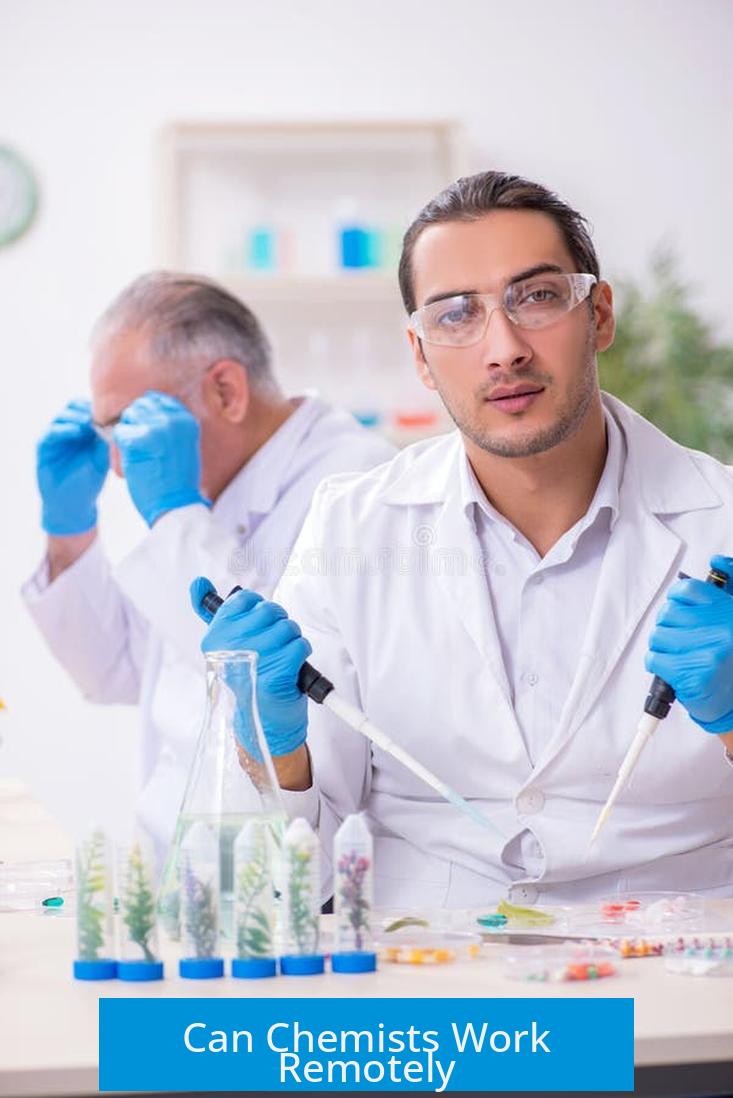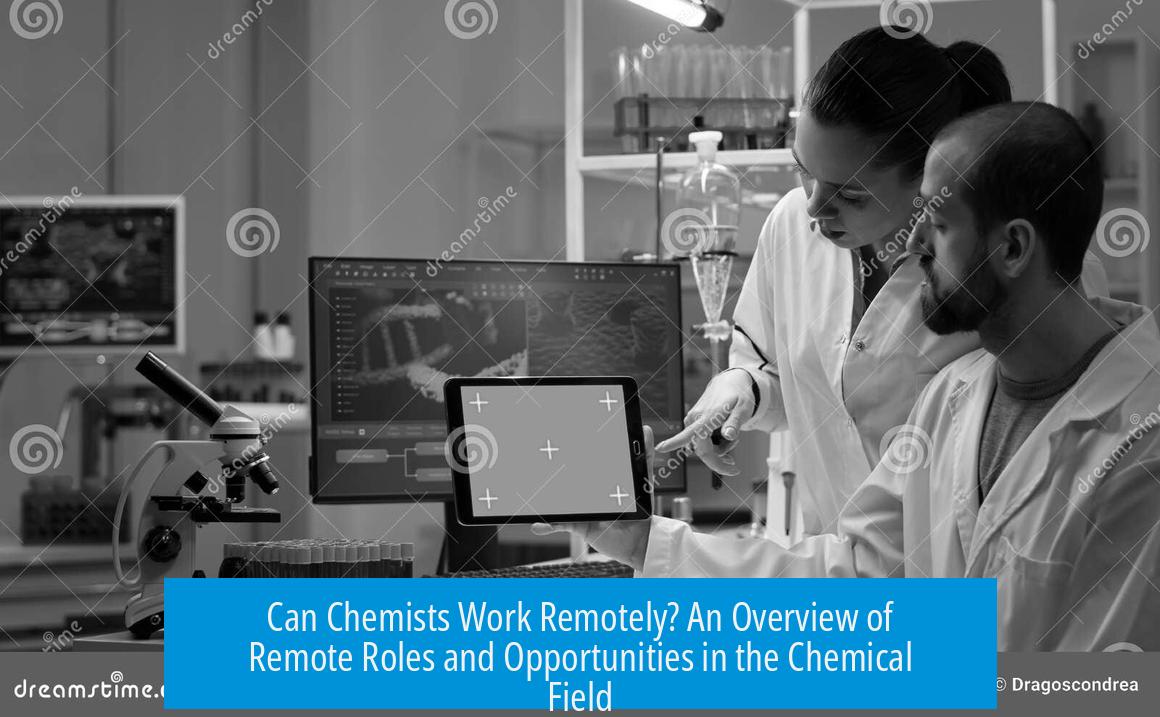Can Chemists Work Remotely?

Chemists can work remotely, but the feasibility depends heavily on their specific roles, experience, and industry. Administrative, computational, regulatory, patent, fieldwork, or consulting roles support remote work well. However, hands-on lab roles generally require onsite presence, with limited tasks done remotely. Senior chemists adapt better to remote setups than juniors due to independence and experience.
Remote Work in Chemistry: General Overview
Flexible Definitions of Remote Work

Remote work in chemistry varies according to what “remote” means and the specific chemistry discipline. Working outside a traditional lab may involve working from home, field sites, or client locations. Flexibility is common but depends on job duties.
Types of Remote-Compatible Chemistry Roles
- Fieldwork roles such as environmental sampling, trials, or visits offer remote flexibility, often combined with travel. When not traveling, work can be done from home.
- Desk-oriented work like patent review, regulatory submissions, and quality documentation can often be performed remotely or partially remote.
- Some labs allow remote data analysis and report writing, making desk work from home possible.
Remote Work Within Lab-Related Roles

Partial Remote Work for Laboratory Chemists
Many lab chemists work primarily onsite but can perform certain tasks remotely. These include data analysis, protocol writing, report generation, and reviewing software outputs.
One chemist accesses chromatography software remotely, reviews colleagues’ reports, writes protocols, and develops presentations from home.
Another chemist reports spending approximately 70% of their time remote, splitting it between field trials and desk research. They still require lab access for benchwork.
In some cases, managers permit lab work outside conventional spaces, such as home-based labs or backyard sheds.
Limitations for Remote Lab Work

- Direct experimental work requires onsite presence for instrument operation and sample handling.
- Attempts to perform full remote lab work often reduce productivity and impair outcomes.
- Hands-on supervision and collaboration remain critical for many lab tasks.
Remote work is thus suited mainly to lab-associated administrative functions rather than core experimental duties.
Experience and Career Stage Impact
Suitability for Senior versus Junior Chemists

Senior chemists excel in remote work due to mastery of their fields, independent workflow, and time management skills.
In contrast, junior chemists benefit more from on-site mentorship, supervision, and peer interaction, making remote work less effective.
Management and supervisory roles typically require onsite visibility and direct team engagement, limiting remote possibilities.
Observed Productivity Impact
Tracking during the pandemic reveals most early-career chemists experienced a 70% performance drop when transitioning fully remote. Tasks that normally took 2-3 hours stretched to 8 hours.
Senior chemists often increased productivity remotely, benefiting from fewer interruptions and greater autonomy.
Specialized Fields and Remote Work Roles
PhD and Management Positions
| Role | Remote Feasibility | Remarks |
|---|---|---|
| Computational Chemist | High | Tasks done mainly on PC; minimal lab visits |
| Outsourced Chemistry Manager | Moderate to High | Manages projects and vendors remotely |
| On-site Lab Manager | Low | Requires presence for oversight, mentoring |
Computational Chemistry and Desk-Oriented Fields
Computational chemistry roles rely on specialized software and data analysis. These positions demand less physical presence and can function effectively from remote locations.
Fields like crystallography or spectroscopy often analyze lab data remotely, while technicians handle sample preparation.
Patent Examination and Regulatory Affairs
- Patent examiner positions suit chemists without graduate degrees, often fully remote.
- Regulatory roles vary; compliance monitoring and documentation can be remote.
- Physical inspections require onsite presence.
Quality Assurance and Consulting
Quality control analysts and consultants frequently combine remote work with field visits. Many can handle data review, reporting, and client communication remotely.
Industry-Specific Examples
Nuclear industry chemists and radiochemists may work semi-remotely, focusing on paperwork and documentation from home while performing critical measurements onsite.
Chemistry professionals in sales or technical teaching often have extensive travel and fieldwork but can work remotely during non-travel days.
Public Service and Government Roles
Scientific evaluators in government departments may work fully from home, applying their chemistry knowledge without lab work. These roles provide stable compensation and utilize expertise in regulatory science, research assessment, or policy.
A federal government scientific evaluator in Australia works from home daily, applying chemistry skills remotely.
Technical Tools Enabling Remote Chemistry Work
- Remote access software allows chems to connect to chromatography, spectroscopy, or lab instrument data from home.
- Cloud-based platforms enable collaborative writing, protocol development, and data sharing.
- Tablets and laptops support monitoring and controlling experiments remotely when equipped with suitable interfaces.
Such technologies are transforming desk-based chemistry roles to allow more remote flexibility.
Summary of Key Points
- Remote work suits primarily desk, computational, regulatory, sales, and consulting chemist roles.
- Hands-on lab positions require physical presence; remote work is generally limited to support tasks.
- Senior chemists typically manage remote work better due to experience and autonomous work habits.
- Junior chemists and managers often need onsite interaction for training and supervising.
- Some industries like nuclear or government agencies provide partial or full remote working opportunities.
- Technology tools enable remote access to lab data and enable flexible work arrangements.
Can Chemists Work Remotely? Unpacking the Truth Behind the Lab Coat
Yes, chemists can work remotely, but only under specific roles and conditions. Remote work suits administrative, computational, field, patent examination, regulatory, or specialized consulting jobs the best. Lab-based roles still typically need onsite presence; however, certain tasks like report writing or data analysis can be handled from home.
Now, that sounds straightforward, but the chemistry world is as diverse as the periodic table itself. Let’s dive deeper into how remote work fits into the life of a chemist—whether you’re mixing chemicals or mixing spreadsheets.
What Does “Remote Work” Mean for Chemists?
First, let’s talk about what remote work even means in chemistry. Unlike a typical office job, chemistry often requires lab access and physical handling of materials. So, remote work isn’t always “working in pajamas” with a laptop on a couch. It may mean working in the field, traveling between sites, or simply toggling between in-lab tasks and desk work.
For example, field chemists often travel a lot but get to work from home when they’re not on the road. Then there are technical service professionals or salespeople using chemistry knowledge out in the real world—not necessarily stuck in a lab.
Lab Life vs. Laptop Life: The Reality
Here is the catch. Most hands-on lab positions require physical presence. Mixing chemicals, running experiments, or handling instruments cannot yet be done remotely. But some experienced chemists manage to work intermittently from home by accessing software remotely or focusing on report writing and protocol creation.
A senior chemist shared that about 70% of their work is remote, split between field trials and desk-based research. They still go to the lab for benchwork, but managerial lab roles evaporate under remote setups. Another colleague amusingly remarked, “My manager lets me do lab work from my shed.” Imagine a shed-turned-lab—talk about DIY chemistry!
But take note—remote lab work can drop productivity significantly. Junior chemists may take 8 hours to finish what normally takes 2 to 3 hours onsite. It turns out, chemistry doesn’t mix well with Zoom fatigue and home distractions. Senior chemists, however, often experience a productivity boost thanks to fewer interruptions.
Senior Chemist vs. Rookie: Remote Work Suitability
Experience matters. Senior chemists who have mastered their daily routines and work with little supervision thrive remotely. They manage their own time, debug experiments, and coach others effectively—even from afar.
Junior chemists, on the other hand, depend heavily on mentorship and direct collaboration. Remote work doesn’t yet replace the hands-on guidance they need. Supervisors also need to be onsite to provide leadership and immediate problem-solving.
Special Roles That Embrace Remote Chemistry
Not all chemists need a physical lab. Certain roles lend themselves to almost fully remote work:
- Computational Chemistry: If you’re comfortable running simulations or analyzing data using powerful computers and software, you might only need a solid laptop and internet.
- Patent Examination: Reviewing patents related to chemical innovations can be largely desk-bound and remote.
- Regulatory Affairs and Compliance: While physical inspections require onsite visits, much of compliance work involves paperwork and data review that you can do from anywhere.
- Quality Assurance (QA) and Consulting: Jobs focusing on quality control or advisory roles sometimes use documentation and analysis work remotely.
- Field Chemists in Specialized Sectors: For example, nuclear plant chemists often split duties between paperwork and onsite lab work, making partial remote work possible.
One nuclear chemist mentioned that most of their work involves paperwork and remote handling, which is a rare but telling example that remote work isn’t out of the question in specialized fields.
Government and Public Service Chemistry Jobs: A Remote Haven?
Public sector roles such as scientific evaluators within government departments sometimes allow full work-from-home days—no lab work involved. A chemist in Australia happily reported starting work remotely after breakfast, utilizing chemistry expertise for evaluations and policy work. This confirms that a remote chemist gig is possible outside corporate labs.
Technical Tools Open Doors to Remote Chemistry
Technology plays a big part. Tools like remote software access (think chromatography software accessed from home) help chemists maintain workflow. For instance, an implant manager controls processes remotely from a PC or tablet. Data analysis, technical writing, protocol generation, and report drafting are all tasks conducive to a home office.
This technological shift means that while the bunsen burners stay in the lab, much of the data crunching and documentation can happen comfortably in slippers.
Is Remote Work the Future for Chemists?
It depends on who you ask and which lab you work at. Chemistry is a hands-on science, but the pandemic and evolving tech have pushed companies to rethink workflows. Senior chemists and those in desk-based roles have seen improved productivity remotely. New grads and lab-heavy roles still struggle.
Can we imagine a future where lab robots perform all benchwork, and human chemists focus on innovation from home? Maybe. Until then, remote chemistry mostly applies to niche roles.
Practical Tips for Chemists Considering Remote Work
- Enhance Computational Skills: Learning computational chemistry software makes you more valuable for remote roles.
- Network in Specialized Fields: Careers in patent law or regulatory affairs often have remote openings.
- Seek Flexible Employers: Find managers who value results over clock-watching and support remote or hybrid schedules.
- Develop Self-Management: Remote work requires discipline, especially without direct supervision.
- Consider Field Roles: Jobs that mix travel and office time offer a form of remote flexibility.
Summary Table: Can Chemists Work Remotely?
| Role Type | Remote Work Feasibility | Notes |
|---|---|---|
| Lab-Based Chemist (Bench Work) | Low | Mostly onsite; partial tasks like report writing may be remote |
| Senior Chemist | Moderate to High | Experienced, self-managed chemists can do much remotely |
| Computational Chemist | High | Work mainly on computers, minimal lab visits |
| Field Chemist / Sales / Tech Support | Moderate | Lots of travel, mixed remote and onsite |
| Patent Examiner / Regulatory Affairs | High | Mostly desk work, suitable for remote |
| Public Sector Evaluator | High | Fully remote desk jobs possible |
Final Thoughts
So, can chemists work remotely? Absolutely—if their role fits the bill. Chemistry isn’t a one-size-fits-all career. Lab-bound chemists will likely spend most time onsite, but those in computational, regulatory, patent, consulting, or field roles have paths to remote or hybrid work. Experience and self-management matter.
As industries evolve and technology advances, remote chemistry roles will grow more common. Until then, grab your lab coat for the bench and your laptop for the reports—because chemistry is a unique blend of hands-on science and analytical thinking that doesn’t shy away from a little flexibility.
How do you imagine remote chemistry evolving in the next decade? Could lab robots go mainstream, or will human chemists always have a bench to mind? Drop your thoughts below!





Leave a Comment